Capacity Building Program for PGT

Day-1
Topics: I : Understanding the scope of National Credit Framework.
II : Dare to Lead – Aspiring Leaders’ Leadership Exploration and Development.
III : Enhancing Personal Effectiveness.
Day and Date : Monday, 27 May 2024
Venue : SPS Mayur Vihar
No. of Teachers Involved: 73 (Teachers from Salwan Schools)
Speakers : Smt. Rashmi Malik, Principal, SPSGGM, Smt. Meera Balachandran, Director, Education Quality Foundation of India, Capt Richa Sharma Katyal (Retd), Principal, SPSMV
The curtain rose on the two-day Continuous Professional Development for PGTs with a warm welcome extended by Capt Richa Sharma Katyal (Retd), addressing Group 1, and Smt. Bhawna Puri, addressing Group 2. Their welcome addresses set the tone for an enriching journey ahead, brimming with opportunities for learning and personal development.
With great enthusiasm, they greeted the participants, acknowledging the diverse backgrounds and experiences that each individual brought to the table. Their call to action was clear: to fully engage and immerse oneself in the learning experience. Encouraging wholehearted participation, they underscored the importance of active involvement in discussions, workshops, and activities.
Dare to Lead – Aspiring Leaders Leadership Exploration and Development
The programme commenced with a session led by featured guest speaker Smt. Meera Balachandran, a distinguished leader in education and the Director of the Education Quality Foundation of India . The Session titled ‘Dare to Lead – Aspiring Leaders’ Leadership Exploration and Development’ commenced with Smt. Indu Sikri’s welcome note, highlighting the aim to foster discussions and share insights through interactive sessions. Capt Richa Sharma Katyal, Principal, SPSMV emphasised the importance of continuous professional development and welcomed Smt. Balachandran, underscoring the collective journey of growth.
Smt. Balachandran shared her inspiring leadership journey, offering invaluable insights and personal anecdotes that deeply resonated with the audience. She delineated various leadership types and their defining characteristics, elucidating the differences between a leader and manager. Emphasising qualities like integrity, empathy, and resilience, she underscored the essence of effective leadership. Her comprehensive exploration provided attendees with a clear understanding of different leadership styles and their application in diverse scenarios.
Key takeaways included the significance of self-awareness, continuous learning, and the ability to inspire and motivate oneself and others. Smt. Balachandran’s discussion underscored the importance of vision, communication, and adaptability in successful leadership. The workshop served as a profound learning experience, equipping participants with the knowledge and inspiration to pursue their leadership aspirations with confidence and clarity.
Smt. Indu Sikri invited Capt. Richa Sharma Katyal, Principal, SPSMV to felicitate Smt. Balachandran. Ms. Namita Sarabhai, Vice Principal, SPS Tronica City, also felicitated Smt. Mukul Jha, Director, Training (SET). The workshop concluded with participants empowered to embark on their leadership journeys with a deeper understanding of leadership principles and attributes.
Understanding the scope of National Credit Framework.
The day continued with the session led by Smt. Rashmi Malik, Principal, SPSGGM, focusing on the National Credit Framework (NCrF). The framework aims to revolutionise the education ecosystem by fostering holistic skill development among learners. The NCrF provides a unified framework for assigning and integrating credits earned across different levels of education, recognising both curricular and vocational aspects. The session highlighted the importance of a competency-based teaching and learning process, where students advance based on their ability to demonstrate competence rather than mere classroom attendance. Smt. Malik elaborated on the framework’s proposal of 1200 notional learning hours per year, with successful completion awarding 40 credits. She emphasised the practical applicability of learning and encouraged educators to align with the NCrF, NEP, and Competency-Based Education for comprehensive educational reform.
The workshop showcased a pilot project at SPS Gurugram, demonstrating the implementation of the NCrF through student-centered learning experiences and competency-based assessments. Illustrations from this project emphasised the shift towards personalised learning experiences, with assignments tailored to develop learners’ skills. Participants were urged to consider implementing NCrF in their schools, fostering a culture of continuous improvement and innovation in education.
Overall, the workshop provided valuable insights into the transformative potential of the NCrF in fostering holistic skill development and personalised learning experiences. Participants gained practical strategies for implementing the framework in their educational institutions, paving the way for a more comprehensive and effective approach to education.
Enhancing Personal Effectiveness
Capt Richa Sharma Katyal, Principal, SPSMV, led Session on ‘Enhancing Personal Effectiveness’, providing invaluable insights into improving personal and professional performance. She commenced by distinguishing between ‘Job’ and ‘Role’, elucidating the multifaceted nature of workplace responsibilities and interactions. This foundational understanding set the stage for a detailed discussion on efficiency, effectiveness, and efficacy.
Thereafter, an engaging activity followed, allowing participants to generate personal efficiency scores, providing actionable insights into areas for improvement. This interactive exercise facilitated self-reflection and identified strategies for enhancing personal effectiveness.
Capt Sharma’s session fostered a lively discussion where participants shared experiences and strategies, promoting mutual learning. The session was well-received, indicating its effectiveness in delivering valuable insights and practical tools for professional growth.
Overall, Capt Richa Sharma Katyal’s CPD training session offered a comprehensive overview of key concepts related to personal effectiveness. Combining theoretical knowledge with interactive activities and group discussions, the session equipped participants with practical strategies to improve performance and achieve professional goals. It underscored the importance of continuous development and collaboration in enhancing personal effectiveness in the workplace.
Sharing of Best Practices
The post-lunch session focused on NEP 2020 implementation in curriculum. Breakout rooms featured presentations on subjects like English, Hindi, Social Science, Mathematics, Commerce, I.T., Science and co-curricular subjects. English and Hindi curriculum integration showcased diverse language activities, VARK model usage, and technology integration. STEM Labs, Python Programming, and AI integration were highlighted for Science and IT. For Social Science, experiential learning and effective map learning strategies were discussed. Government portals that enhance student creativity were furthermore underscored. For Maths and Commerce, key strategies to incorporate competency based and interdisciplinary learning were stressed upon. For co-curricular subjects, their seamless integration with the academic curriculum was discussed, along with the importance of these in ensuring the wholistic development of children.
The session emphasised digital infrastructure investment, cyber safety, and blended learning. The discussion explored innovative teaching methodologies and pedagogical approaches that promote active learning, critical thinking, and problem-solving skills. Strategies such as flipped classrooms, case-based learning, and project-based assessments were highlighted as effective means to engage students and foster deeper learning outcomes. Exemplary practices from different sister schools were shared, promoting holistic learning aligned with NEP principles and fostering collaboration.

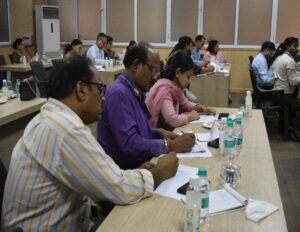
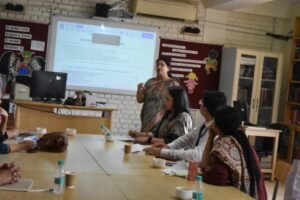
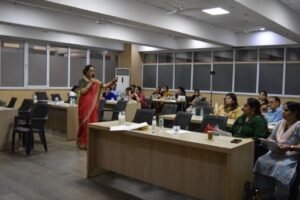
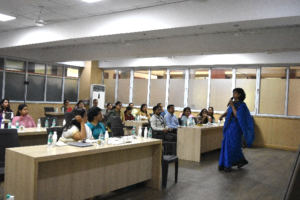
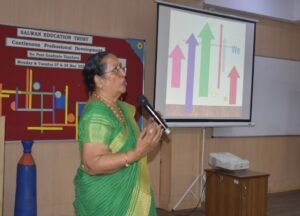
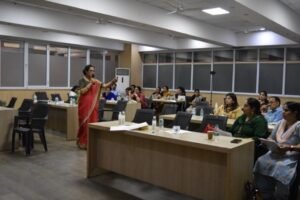




















Leave a Reply